|
|
|
Sort Order |
|
|
|
Items / Page
|
|
|
|
|
|
|
| Srl | Item |
| 1 |
ID:
097755


|
|
|
|
|
| Publication |
2010.
|
| Summary/Abstract |
Recent research, including an article by Charles Kupchan and Peter Trubowitz in this journal, has argued that the United States' long-standing foreign policy orientation of liberal internationalism has been in serious decline because of rising domestic partisan divisions. A reanalysis of the theoretical logic driving these arguments and the empirical evidence used to support them suggests a different conclusion. Extant evidence on congressional roll call voting and public opinion surveys, which is often used to support the claim that liberal internationalism has declined, as well as new evidence about partisan divisions in Congress using policy gridlock and cosponsorship data from other studies of American politics do not demonstrate the decline in bipartisanship in foreign policy that conventional wisdom suggests. The data also do not show evidence of a Vietnam War or a post-Cold War effect on domestic partisan divisions on foreign policy. Contrary to the claims of recent literature, the data show that growing domestic political divisions over foreign policy have not made liberal internationalism impossible. It persists as a possible grand strategy for the United States in part because of globalization pressures.
|
|
|
|
|
|
|
|
|
|
|
|
|
|
|
|
| 2 |
ID:
128267
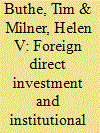

|
|
|
|
|
| Publication |
2014.
|
| Summary/Abstract |
International trade agreements lead to more foreign direct investment (FDI) in developing countries. This article examines the causal mechanisms underpinning this trade-investment linkage by asking whether institutional features of preferential trade agreements (PTAs), which allow governments to make more credible commitments to protect foreign investments, indeed result in greater FDI. The authors explore three institutional differences. First, they examine whether PTAs that have entered into force lead to greater FDI than PTAs that have merely been negotiated and signed, since only the former constitute a binding commitment under international law. Second, they ask whether trade agreements that have investment clauses lead to greater FDI. Third, they consider whether PTAs with dispute-settlement mechanisms lead to greater FDI. Analyses of FDI flows into 122 developing countries from 1971 to 2007 show that trade agreements that include stronger mechanisms for credible commitment induce more FDI. Institutional diversity in international agreements matters.
|
|
|
|
|
|
|
|
|
|
|
|
|
|
|
|
| 3 |
ID:
164543


|
|
|
|
|
| Summary/Abstract |
The economic-nationalist bargain substitutes protectionism for welfare policy.
|
|
|
|
|
|
|
|
|
|
|
|
|
|
|
|
| 4 |
ID:
145716
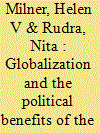

|
|
|
| 5 |
ID:
139797
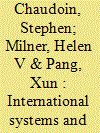

|
|
|
|
|
| Summary/Abstract |
Following older debates in international relations literature concerning the relative importance of domestic versus systemic factors, newer debates emphasize interdependence among states and the complex interactions between systemic and domestic factors. As globalization and democratization advance, theories and empirical models of international politics have become more complicated. We present a systematic theoretical categorization of relationships between domestic and systemic variables. We use this categorization so that scholars can match their theory to the appropriate empirical model and assess the degree to which systemic factors affect their arguments. We also present two advances at the frontier of these empirical models. In one, we combine hierarchical models of moderating relationships with spatial models of interdependence among units within a system. In the other, we provide a model for analyzing spatial interdependence that varies over time. This enables us to examine how the level of interdependence among units has evolved. We illustrate our categorization and new models by revisiting the recent international political economy (IPE) debate over the relationship between trade policy and regime type in developing countries.
|
|
|
|
|
|
|
|
|
|
|
|
|
|
|
|
| 6 |
ID:
128264
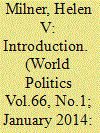

|
|
|
|
|
| Publication |
2014.
|
| Summary/Abstract |
The world economy has maintained or enhanced its integration in the past decade even in the face of the global financial crisis. A large part of this globalization has been driven by capital flows. This symposium focuses on one element of these capital flows, foreign direct investment (FDI), and on the regime in place to safeguard and promote such investments around the globe. The articles by Allee and Peinhardt and Simmons focus on the nature and evolution of the bilateral investment treaties (BITs) that have been developed to protect such investments and that have proliferated since the 1990s. The final article, by Büthe and Milner, turns its attention to the ways in which international trade agreements affect FDI. The comparison between the investment and trade agreements is instructive, since they seem to have different effects.
FDI has become one of the most important economic flows in the global economy. It is a critical source of capital for developing countries and remains a significant source of investment in the developed world. FDI has grown in part because countries changed their policies toward it dramatically after the 1980s; governments in developing countries made unilateral policy changes that opened up markets across the globe and increased competition among countries for FDI.
|
|
|
|
|
|
|
|
|
|
|
|
|
|
|
|
| 7 |
ID:
138165
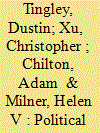

|
|
|
|
|
| Summary/Abstract |
A great deal of political economy scholarship has focused on how countries can attract foreign direct investment (FDI), and the effects of FDI on growth and political stability. A related topic that has received almost no attention, however, is that of divergent political reactions to inflows of FDI in the countries receiving investments. This is an oversight, because inward FDI flows are not equally welcomed by the host country and, in fact, often encounter strong political opposition. We study this phenomenon by examining political opposition to attempts by Chinese companies at mergers and acquisitions (M&As) with US firms. This is especially important given rapidly expanding Chinese M&A activity. We hypothesise that although most legal barriers to foreign M&As are based on national security considerations, objections on these grounds are often vehicles through which to channel other grievances, and that economic distress and reciprocity are also key drivers of political opposition. To test this theory, we constructed an original dataset of 569 transactions that occurred between 1999 and 2014 involving Chinese acquirers and American targets. We find that there is more likely to be opposition to Chinese M&A attempts in security sensitive industries, economically distressed industries, and sectors in which US companies faced restrictions in China’s M&A markets.
|
|
|
|
|
|
|
|
|
|
|
|
|
|
|
|
| 8 |
ID:
179771


|
|
|
|
|
| Summary/Abstract |
Do world politics affect the adoption of new technology? States overwhelmingly rely on technology invented abroad, and their differential intensity of technology use accounts for many of their differences in economic development. Much of the literature on technology adoption focuses on domestic conditions. The authors argue instead that the structure of the international system is critical because it affects the level of competition among states, which in turn affects leaders’ willingness to enact policies that speed technology adoption. Countries adopt new technology as they seek to avoid being vulnerable to attack or coercion by other countries. By systematically examining states’ adoption of technology over the past two hundred years, the authors find that countries adopt new technologies faster when the international system is less concentrated, that changes in systemic concentration have a temporally causal effect on technology adoption, and that government policies to promote technology adoption are related to concerns about rising international competition. A competitive international system is an important incentive for technological change and may underlie global technology waves.
|
|
|
|
|
|
|
|
|
|
|
|
|
|
|
|
| 9 |
ID:
131002
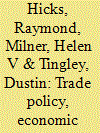

|
|
|
|
|
| Publication |
2014.
|
| Summary/Abstract |
Developing countries have increasingly opened their economies to trade. Research about trade policy in developed countries focuses on a bottom-up process by identifying economic preferences of domestic groups. We know less about developing countries. We analyze how economic and political variables influenced Costa Rican voters in a referendum on CAFTA-DR, an international trade agreement. We find little support for Stolper-Samuelson models of economic preferences, but more support for specific factor models. We also isolate the effects of political parties on the referendum, controlling for many economic factors; we document how at least one party influenced voters and this made the difference for CAFTA-DR passage. Politics, namely parties using their organizational strength to cue and frame messages for voters, influenced this important trade policy decision. Theories about trade policy need to take into account top-down political factors along with economic interests.
|
|
|
|
|
|
|
|
|
|
|
|
|
|
|
|
| 10 |
ID:
102538


|
|
|
|
|
| Publication |
2011.
|
| Summary/Abstract |
In this article we bring together opposing international relations theories to better understand U.S. foreign policy, in particular foreign trade and aid. Using votes in the U.S. House of Representatives from 1979-2004, we explore different theoretical predictions about preferences for foreign economic policy. We assess the impact of domestic factors, namely political economy and ideological preferences, versus foreign policy pressures. Our three main results highlight the differential effect of these factors in the two issue areas. First, aid preferences are as affected by domestic political economy factors as are trade preferences. Second, trade preferences, but not economic aid ones, are shaped by the president's foreign policy concerns; for economic aid, domestic political economy factors matter more than foreign policy ones. Third, aid preferences are shaped more by ideological factors than are trade ones, but ideology plays a different substantive role in each. Different constituencies support aid and trade. This finding has implications for foreign policy substitutability, "the internationalist coalition" in U.S. foreign policy, "statist" theories of foreign policy, and the connection between public opinion and legislative voting.
|
|
|
|
|
|
|
|
|
|
|
|
|
|
|
|
| 11 |
ID:
060949


|
|
|
|
|
|
|
|